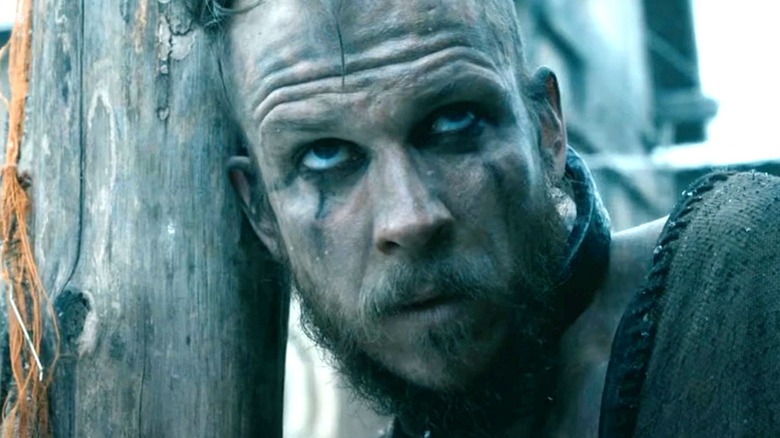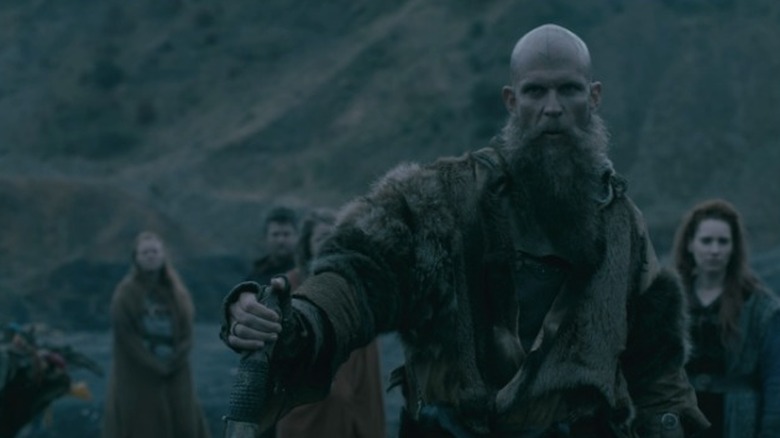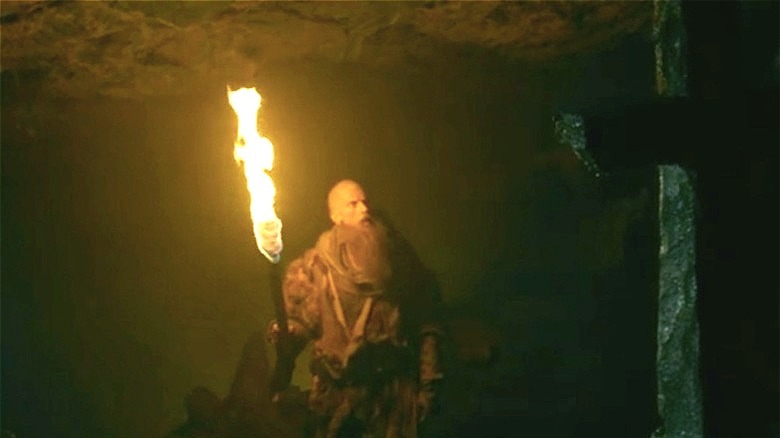The Floki Theory That Would Change Everything On Vikings
Excepting Alex Høgh Andersen's Ivar the Boneless and Travis Fimmel's Ragnar Lothbrok, few characters in creator Michael Hirst's "Vikings" are as compelling and unpredictable as the master builder — and eventual explorer, and settler – Floki, portrayed in the series by Gustaf Skarsgård.
Floki serves as Ragnar's right-hand man and supportive, forest-dwelling shipbuilder, though his affection for the saga-inspired series' protagonist is directly tied to Ragnar's approval, praise, and unconditional love and belief in both Floki and his gods. More than once in the six-season History channel phenomenon, Floki appears to betray, strongly considers betraying, or ultimately decide to betray his best friend and leader. Throughout the series, Skarsgård made good use of his seemingly elastic limbs and 6'4" stature, turning his easily amused, easily angered on-screen persona into a sprite-like apparition whose slinky, Puck-like movements were further punctuated by the smoldering glance of his heavily-lined eyes.
His movements and unique aesthetic alone might well have been enough to spark a certain skepticism in fans about just how mortal the die-hard pagan was, but it was his familiar-sounding name and a handful of equally familiar plot points that led to an interesting theory about the character.
Fans think Floki might actually be a god
In a post on the series' popular subreddit, a user presented this theory to other fans, many of whom already had similar thoughts, or else were swayed by the original poster's argument.
"Floki on the 'Vikings' TV series is actually the god Loki," the user wrote, referencing the Norse god of mischief (made further famous in pop culture by Tom Hiddleston in Marvel's "Thor" franchise). Among other things, the fan pointed out that the Norse gods were known for "hiding in plain sight as humans," and that "going by Floki, which sounds so similar to Loki, seems like something that would amuse [the god]."
User mcchoochoo pointed out that Floki brings the same chaotic energy to his surrounding as the Norse god, lending further credibility to this theory. Another viewer noted that "if Floki is Loki, then it would make sense that Thor would celebrate [Floki's new] ship's debut with thunder and lightning" (via Reddit), which is exactly what occurs when a violent storm erupts as Ragnar and his rogue crew sail West for the first time.
Many fans on the thread had long thought Floki's name was Loki, and pointed to a Season 1 scene wherein Ragnar takes his son to meet his friend and refers to the latter's name as "like the god." It's a compelling theory, and one that's supported both by the character's intense devotion to Norse religion and by various outlets such as CBR and TV Guide, the latter of which reveals that Bjorn actor Alexander Ludwig lent his support to the notion, as well. The evidence is certainly there, but how likely is it that Hirst intended his eccentric carpenter to be seen as none other than Scandinavia's most playfully devious deity?
Is Floki actually a Loki, the god of mischief?
The resemblance of the two names notwithstanding, it's important to remember that Hirst based the majority of his narrative on a blend of historical sources and the Icelandic Sagas, such as "The Sagas of Ragnar Lodbrok." As it turns out, there was (likely) a real-life Icelandic settler named Hrafna-Flóki', whose story can be found in the medieval "Book of Settlements," or, "Landnámabók," as Vikings Brand writer Nokki Nollason points out. "Sagas first mention Floki as the boat builder and explorer from Norway who was the first man ever to deliberately search for Iceland [...] a necklace with a hammer of Thor was around his neck at all times, as a sign of both his heritage and his devotion to this mighty God."
In other words, Floki may have much in common with Loki, but he appears to have just as much in common with the historical Icelander who shares his name.
Like so much of Hirst's series — including the ongoing debate about who Kevin Durand's mysterious Harbard is (via Reddit) — the answer seems intentionally vague and undefined. As Ludwig rightly predicted to TV Guide, the question was "left up in the air." Ultimately, given the weight the series placed on Floki's interaction with the cross (in Season 5, Episode 19), it's every bit as likely the character isn't meant to represent a god, but his people's fading belief in them, and the death of those gods (or, "Ragnarok") at the hands of Christianity. He is, after all, literally buried (though not fatally so), by the fall-out of the cross' surrounding volcano.


